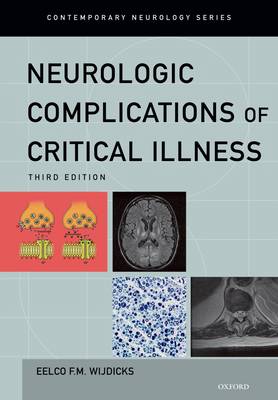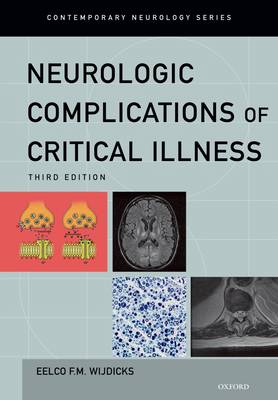
En raison d'une grêve chez bpost, votre commande pourrait être retardée. Vous avez besoin d’un livre rapidement ? Nos magasins vous accueillent à bras ouverts !
- Retrait gratuit dans votre magasin Club
- 7.000.000 titres dans notre catalogue
- Payer en toute sécurité
- Toujours un magasin près de chez vous
En raison de la grêve chez bpost, votre commande pourrait être retardée. Vous avez besoin d’un livre rapidement ? Nos magasins vous accueillent à bras ouverts !
- Retrait gratuit dans votre magasin Club
- 7.000.0000 titres dans notre catalogue
- Payer en toute sécurité
- Toujours un magasin près de chez vous
Description
Consults in the Intensive Care Unit to evaluate and manage acute neurological clinical problems are usually of considerable complexity and are the most challenging ones. This single authored monograph is the standard reference on neurological complications of critically ill patients and has been the first and only book of its kind. This comprehensive book will assist the neurologist to recognize and treat complex neurological complications in critically ill patients admitted to medical, surgical, trauma, and transplant intensive care units. Every chapter provides a representative selection of the state of the art in the intensive care unit, necessary for an understanding of critical care medicine. It offers practical advice on how to best deal wtih coma after cardiopulmonary resuscitation, failure to awaken after surgery, delirium, new onset seizures, generalized weakness, acute paraplegia, movement disorders, and many other manifestations of a neurologic emergency. Other topics include neurologic complications after organ transplantation, spinal cord injury after thoracoabdominal surgery, neurologic complications of invasive procedures and devices, complications from cardiac surgery, traumatic brain, spine, and peripheral nerve injury, and environmental injuries such as hypothermia and near drowning. This book also addresses end of life care in the intensive care unit and the responsibilities of the consulting neurologist. This third edition has been thoroughly updated and expanded with new chapters on viral infectious outbreaks (West Nile and tick-borne encephalitis), intoxication, poisoning, and chemical and biowarfare. The book closes with a new chapter that provides a practical model on how to best approach these complex patients and five common scenarios are discussed. This third edition adds more than 100 new figures, tables and helpful maangement algorithms, and over 500 new references. All major topics are discussed systematically, thoroughly, and logically. This book is a key practical text for neurologists, intensivists, trauma surgeons, transplant surgeons, and trainees, but also is essential for the critical care nursing staff.
Spécifications
Parties prenantes
- Auteur(s) :
- Editeur:
Contenu
- Nombre de pages :
- 480
- Langue:
- Anglais
- Collection :
- Tome:
- n° 74
Caractéristiques
- EAN:
- 9780195371093
- Date de parution :
- 29-04-09
- Format:
- Livre relié
- Format numérique:
- Genaaid
- Dimensions :
- 254 mm x 178 mm
- Poids :
- 1139 g

Les avis
Nous publions uniquement les avis qui respectent les conditions requises. Consultez nos conditions pour les avis.






